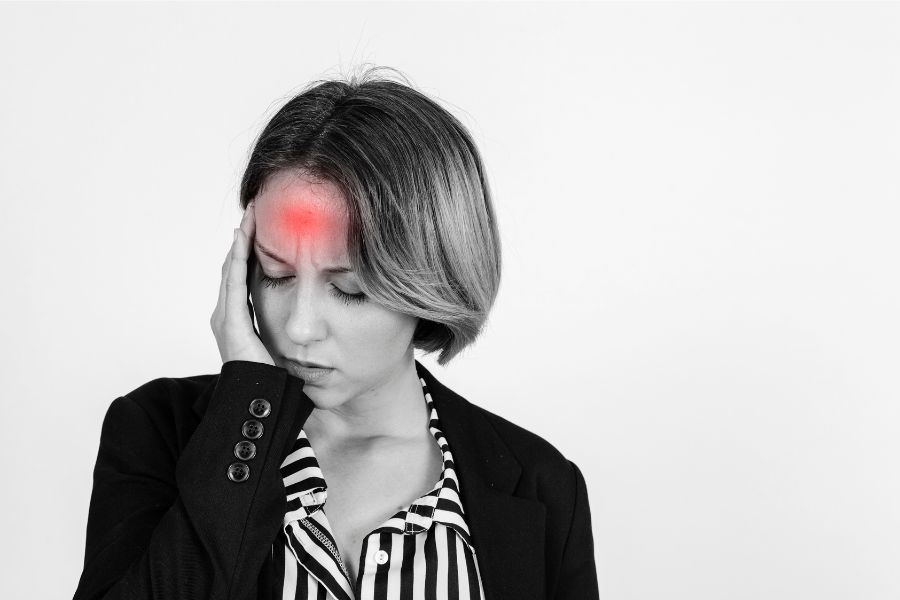Headache and Vertigo Treatment in Wakad, Pimpri Chinchwad, Pune by Dr. Chetna Patil
Headache and vertigo are among the most common neurological complaints that affect people of all age groups. While headaches can range from mild tension-type pain to severe migraines, vertigo often presents as a disturbing sensation of spinning or imbalance, significantly impacting daily activities. Dr. Chetna Patil provides expert, compassionate, and comprehensive care for patients suffering from these conditions, focusing on accurate diagnosis and effective treatment strategies.

Understanding Headache
Headaches may arise from various causes—stress, poor posture, eye strain, dehydration, sinus problems, or neurological disorders such as migraine and cluster headaches. Some headaches are primary in nature, meaning they are not linked to another illness, while secondary headaches may be symptoms of underlying conditions like hypertension, infections, or neurological diseases.
Dr. Chetna Patil carefully evaluates the type, frequency, and triggers of headaches through detailed history-taking, clinical examination, and if required, advanced investigations such as MRI or CT scans. This thorough approach ensures that the root cause is identified rather than just treating the symptoms.
Treatment Options for Headache Include:
- Lifestyle modification (sleep hygiene, stress management, posture correction)
- Identifying and avoiding dietary or environmental triggers
- Medications for acute relief (pain relievers, triptans)
- Preventive therapies for recurrent migraines or chronic headaches
- Nerve block therapies in resistant cases
- Guidance on complementary therapies such as relaxation exercises, yoga, and physiotherapy
Understanding Vertigo
Vertigo is not just dizziness—it is a specific sense of spinning, imbalance, or being pulled in one direction. It may arise from inner ear disorders (such as Benign Paroxysmal Positional Vertigo, Meniere’s disease, or vestibular neuritis) or from neurological causes like migraine-associated vertigo, stroke, or multiple sclerosis.
Dr. Chetna Patil uses a systematic diagnostic approach to distinguish between peripheral (ear-related) and central (brain-related) vertigo. This involves a detailed clinical assessment, vestibular function tests, balance evaluation, and sometimes neuroimaging studies.
Treatment Options for Vertigo Include:
- Positional maneuvers such as the Epley maneuver for BPPV
- Medications to reduce dizziness, nausea, and vestibular overactivity
- Preventive therapy in migraine-related vertigo
- Balance rehabilitation therapy and physiotherapy for long-term stability
- Lifestyle advice on hydration, diet, and activity modification
- Advanced treatments for complex or resistant vertigo conditions
Frequently Asked Questions
Headaches can occur for many reasons, and they happen when pain-sensitive areas in the head—such as nerves, blood vessels, and muscles—are activated. Common causes include stress, dehydration, lack of sleep, poor posture, eye strain, or skipping meals. Other triggers can be environmental (like loud noises or strong smells), hormonal changes, or certain foods and drinks. Some headaches are a symptom of an underlying condition, such as sinus infections, high blood pressure, or migraines. While most headaches are not serious, frequent or severe headaches may require medical evaluation.
Headaches are common during pregnancy and can occur due to several physical and hormonal changes happening in the body. Common causes include:
Hormonal fluctuations: Rising levels of hormones like estrogen can affect brain chemicals and lead to headaches, especially in the first trimester.
Increased blood volume and circulation: Pregnancy increases blood flow, which can put pressure on blood vessels and trigger headaches.
Dehydration: Pregnant women need more fluids; not drinking enough water can lead to dehydration and headaches.
Fatigue and lack of sleep: Changes in sleep patterns and physical exhaustion can contribute to headaches.
Stress: Emotional and physical stress during pregnancy may also play a role.
Low blood sugar: Skipping meals or not eating enough can cause dips in blood sugar levels, leading to headaches.
Caffeine withdrawal: Reducing or stopping caffeine intake during pregnancy can cause withdrawal headaches.
In some cases, headaches—especially if severe or occurring in the second or third trimester—could signal a more serious condition like preeclampsia. Always consult a healthcare provider if headaches are persistent, severe, or unusual during pregnancy.
Headaches during periods are usually caused by hormonal changes. Just before and during menstruation, the levels of estrogen and progesterone in the body drop. This hormonal shift can trigger headaches or even migraines in some women. In addition, period-related headaches may also be worsened by dehydration, stress, lack of sleep, skipped meals, or caffeine withdrawal.
For most women, these headaches are temporary and occur in a predictable pattern around their cycle. If headaches are very severe, frequent, or interfere with daily activities, it’s a good idea to consult a doctor for evaluation and treatment options.
Headaches themselves usually do not directly cause high blood pressure. However, certain types of headaches, such as stress-related or migraine headaches, can temporarily raise blood pressure due to pain, anxiety, or tension. On the other hand, very high blood pressure (hypertensive crisis) can sometimes cause a severe headache as a symptom. If you experience a sudden, intense headache along with dizziness, chest pain, or vision problems, it may be a medical emergency and you should seek immediate care.
Headache itself does not directly cause fever. However, both can occur together as symptoms of an underlying condition. Fever usually indicates that the body is fighting an infection or inflammation, and the headache may develop as a response to that illness. Common causes where headache and fever appear together include viral infections (like flu or COVID-19), sinus infections, meningitis, or other systemic illnesses.
Headache itself does not directly cause fever. However, both can occur together as symptoms of an underlying condition. Fever usually indicates that the body is fighting an infection or inflammation, and the headache may develop as a response to that illness. Common causes where headache and fever appear together include viral infections (like flu or COVID-19), sinus infections, meningitis, or other systemic illnesses.
Most headaches are harmless and related to stress, tension, sinus issues, or migraines. However, some headaches can signal serious underlying conditions and should not be ignored. A headache may be dangerous if it is:
Sudden and severe (“thunderclap headache”) – comes on within seconds or minutes.
Associated with fever, neck stiffness, or rash – could indicate meningitis or infection.
New or different in pattern – especially after age 50.
Linked with neurological symptoms – such as vision changes, weakness, numbness, difficulty speaking, or confusion.
Triggered after head injury – may suggest internal bleeding.
Worsening with coughing, exertion, or lying down – can be a sign of raised brain pressure.
👉 If you experience any of these warning signs, seek immediate medical attention.
Most headaches are harmless and may be due to stress, lack of sleep, dehydration, or minor illnesses. However, a headache can be serious if it is sudden, very severe, or different from your usual pattern. You should seek medical help immediately if your headache is accompanied by:
Sudden, severe “worst headache of your life”
Headache after a head injury
Headache with fever, stiff neck, or rash
Headache with blurred vision, confusion, fainting, or seizures
Headache with weakness, numbness, or difficulty speaking
A new or worsening headache in people over 50 years
👉 If you experience any of these warning signs, consult a doctor urgently.
Headaches that occur on one side of the head are often due to specific underlying causes. The most common reasons include migraine, which typically presents with throbbing pain on one side, and cluster headaches, which cause severe, sharp pain around one eye or temple. Sometimes, tension-type headaches or sinus issues can also affect one side more than the other. Rarely, serious conditions like vascular problems or nerve-related issues may be responsible.
If you frequently experience one-sided headaches, especially with symptoms like vision changes, nausea, or weakness, it is best to consult a doctor for proper evaluation and treatment.
Headaches are generally divided into two main categories:
Primary Headaches – These are not caused by another medical condition. Common types include:
Tension Headache – Dull, pressure-like pain, often on both sides of the head.
Migraine – Intense, throbbing pain, usually one-sided, often with nausea, light or sound sensitivity.
Cluster Headache – Severe, stabbing pain around one eye, occurring in repeated “clusters” over weeks or months.
Secondary Headaches – These occur due to an underlying condition such as fever, sinus infection, high blood pressure, head injury, or other medical issues.
👉 If you experience sudden, very severe, or unusual headaches, it is important to seek medical advice promptly.
Holistic and Patient-Centered Care
Dr. Chetna Patil believes in offering personalized treatment plans tailored to each patient’s specific condition and health needs. Her approach combines medical expertise with patient education, ensuring individuals understand their condition and actively participate in their treatment and recovery.
By addressing both headaches and vertigo comprehensively, Dr.Chetna Patil helps patients regain control over their daily lives, reduce the frequency and severity of episodes, and improve overall quality of life.
Book an Appointment with The Best Neurologist in Pune & PCMC
Dr. Chetna Patil is a highly qualified neurologist, neurophysician in PCMC, Pune. She practices at Advanced Brain & Spine Clinic in Wakad, Pune. She has 12+ years of experience of treating patients with neurological diseases.
Our Services
Wakad
- +91 80108 66994
- Shop No. 115, 1st Floor, WESTWOOD ESTATES, opp. Mont Vert Tropez Road, Kaspate Wasti, Wakad, Pimpri-Chinchwad - 411057
- Mon to Sat/ 8 AM–10 PM
- absclinicwakad@gmail.com
Location
Copyright © 2026 – All rights reserved. Created and Maintained by – DMX DIGITAL
WhatsApp us


